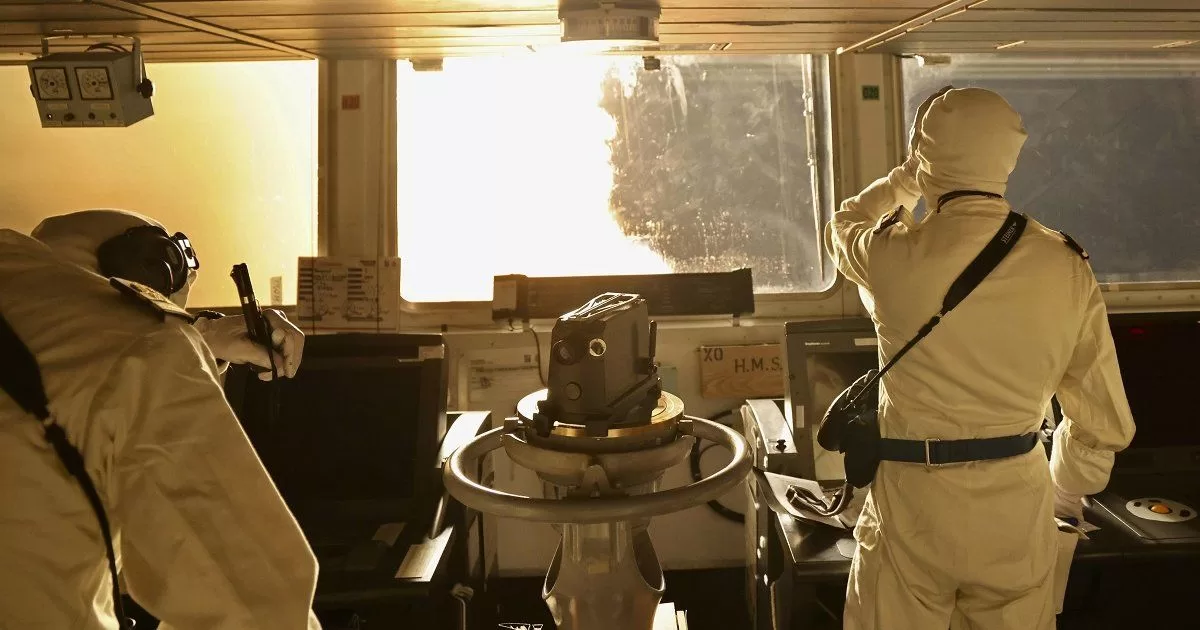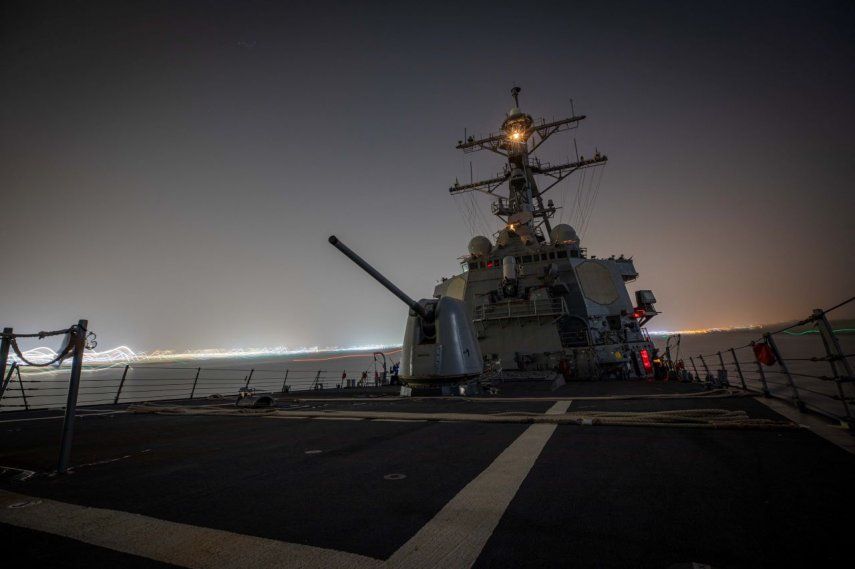At dawn, the bombings lit up the sky in several places controlled by the Iranian-backed rebels. Saudi Arabia sought to quickly distance itself from the attacks in an attempt to maintain a delicate detente with Iran and a ceasefire in the war in Yemen, from which it hopes to finally withdraw.
The attack also threatened to provoke a regional conflict over Israel’s war against Hamas, which both the US government and its allies have been trying to calm for weeks.
For its part, the United States Navy acknowledged an attack that occurred days earlier against a ship in the confines of the Indian Ocean — which could indicate Iran’s willingness to attack vessels within a broader maritime campaign due to the conflict between Israel and Hamas. Besides, Tehran seized on Thursday an oil tanker involved in a previous crisis with Washingtonwhich at the time confiscated its cargo: Iranian crude oil affected by international sanctions on the nuclear program of the Islamic Republic.
Although the extent of the damage caused by the US offensive was unknown at the moment, the Houthis They said at least five locations, including airfields, had been attacked. United Kingdom said that its attacks hit a location in Bani supposedly used by rebels to shoot drones, and an airfield in Abbus from which missiles and drones would have been launched.
Threatens to dire consequences
Hussein al-Ezzi, a Houthi foreign ministry official, acknowledged “a massive attack with American and British ships, submarines and warplanes.”
“The United States and the United Kingdom will undoubtedly have to prepare to pay a high price and suffer the dire consequences of this blatant aggression,” wrote al-Ezzi online.
The main negotiator and spokesperson for the rebels, Mohammed Abdul-Salam, indicated that Washington and London “did a stupid thing with this treacherous aggression.”
“They are wrong if they think they will dissuade Yemen from supporting Palestine and Gaza,” he said in an online message, noting that Houthi attacks “will continue to affect Israeli ships or those heading to ports in occupied Palestine.”
Since the attacks began in November, the Houthis have targeted ships with little or dubious ties to Israel, disrupting shipping on a key route for global trade.
The rebels’ military spokesman, Brigadier General Yahya Saree, indicated in a recorded message that 73 attacks were recorded in five regions of Yemen under his control, in which five members of the rebel forces died and another six were injured.
“The American and British enemy is fully responsible for their criminal aggression against our Yemeni people, which will not go unanswered or unpunished,” Saree said.
In Saada, the Houthi stronghold in northwestern Yemen, hundreds of people participated in a protest on Friday in which, at times, they chanted the rebels’ slogan: “God is great; death to the United States; cursed be the Jews; victory for Islam.”
Yemen has been the target of US military action under the administrations of its last four presidents. Under George W. Bush, a campaign of drone attacks against the local affiliate of Al Qaeda began, an initiative that has continued under Joe Biden. On the other hand, Washington has carried out raids and other military operations in the midst of the ongoing armed conflict in the country.
History of the conflict
That war began when the Houthis entered the capital, Sana’a, in 2014. A Saudi-led coalition, including the United Arab Emirates, launched a campaign to back the Yemeni government-in-exile in 2015, transforming the conflict into a regional confrontation as Iran provides weapons and other aid to the rebels.
The war, however, has slowed as the Houthis maintain control over the territories they captured. Emirates was attacked by rebel missiles several times in 2022, But after exiting the conflict, Saudi Arabia reached an agreement with Iran — brokered by China — to ease tension in the hope of withdrawing from the conflict.
At the moment there is no global pact, which may have motivated the message of “great concern” launched on Friday by Riyadh after the air offensive.
“Although the kingdom highlights the importance of maintaining security and stability in the Red Sea region (…) it calls for moderation and to avoid an escalation,” said a statement from its Foreign Ministry.
Iran, which has supplied weapons and aid to Yemeni rebels, condemned the offensive in a statement by Foreign Ministry spokesman Nasser Kanaani.
“Arbitrary attacks will have no other result than fueling insecurity and instability in the region,” he stated.
The Lebanese insurgent group Hezbollah, which is also backed by Tehran and exchanged fire with Israel on their common border, criticized the attacks and considered the United States “a full partner in the catastrophes and massacres committed by the Zionist entity in Loop”. Hamas also condemned what happened.
In Beijing, Foreign Ministry spokesperson Mao Ning asked that tensions not rise in the Red Sea and urged the different sides to act with restraint.
On the other hand, the US Navy confirmed on Friday an attack that occurred days earlier near the coasts of India and Sri Lanka. The Pacific Gold chemical tanker was hit on January 4 by what authorities described as a “unilateral Iranian attack” with a drone, which caused some damage to the vessel but left no injuries.
“Iran’s actions are contrary to international law and threaten maritime security and stability,” said Vice Admiral Brad Cooper, head of the 5th Fleet, based in the Middle East.
The Pacific Gold is managed by Eastern Pacific Shipping, a Singapore-based shipping company that is ultimately controlled by Israeli millionaire Idan Ofer. Eastern Pacific, as well as Indian and Sri Lankan officials, did not respond to multiple requests for comment from The Associated Press about the incident. The shipping company had already been the target of other alleged Iranian attacks.
The incident had been confirmed to the AP by a private security official. The attack was first reported by the Lebanese network Al-Mayadeen, politically affiliated with Hezbollah and which has already announced other attacks linked to Tehran in the region. Iran has not claimed responsibility.
Key aspects of the conflict
Iran-backed Houthis control about a third of Yemen and they have a brave and well-trained force. Below are four key aspects about these rebels attacked by the United States and the United Kingdom, who accuse them of endangering navigation in the mar Rojo.
Iranian support
- The Houthis have the support of Iran, a regional power and archrival of Israel and Saudi Arabia.
- The Yemeni rebels are part of the so-called “axis of resistance”, a concept that includes anti-Israel movements in the region, such as Palestinian Hamas and Lebanese Hezbollah, as well as groups from Iraq and Syria.
- Shortly after the start of the war between Hamas and Israel on October 7, sparked by an unprecedented attack by the Palestinian Islamist movement on Israeli soil, the Houthis multiplied attacks off the Yemeni coast against commercial ships that they said were linked to Israeli interests.
- A way to show solidarity with the Palestinians of Gaza, constantly bombed by the Israeli army.
- The United States decided to deploy warships in the mar Rojo and launch an international force to guarantee security in this area through which 12% of world trade passes. At the same time, it accuses Iran of encouraging these attacks, something that Tehran denies.
Brave
- With a force estimated a few years ago at at least 200,000 men, the Houthis are well trained and accustomed to fighting in Yemen’s harsh, mountainous terrain.
- After taking the capital Sanaa in 2014, they took over large areas of the country, the poorest in the Arabian Peninsula.
- Its long-range missiles and drones, developed with Iranian technology, are, according to rivals, considered a serious threat to its Gulf neighbors.
- In the past, the Houthis attacked Saudi Arabia and the United Arab Emirates, members of the military coalition that has supported the Yemeni government against the rebels since 2015.
- After fighting the Houthis for more than eight years, Riyadh began talks with them last year, hoping to end a long conflict that devastated the country and caused a dire humanitarian situation.
Popularity
- Despite the death of thousands of combatants, the Houthis continue to attract young recruits in this country of 30 million inhabitants, plunged into one of the worst humanitarian crises on the planet.
- By saying they are attacking Israel and its American ally in solidarity with the Palestinians of Gaza, the Houthis have gained visibility and galvanized their popular base in Yemen, in addition to connecting with the rest of the region, experts say.
Componente do
- Coming from the north, the Houthis were formed as a movement in the 1990s to fight against the marginalization suffered by their religious community, the Zaidites, a branch of Shiite Islam in this Sunni-majority country.
- The Zaidites had their heyday in northern Yemen with the establishment of an imamate (a political regime led by an imam) in the 9th century, which lasted until the 20th century.
- In the territories they control, the Houthis have imposed very strict social and religious norms, which particularly concern women.
Source: With information from AP/AFP/EUROPA PRESS



